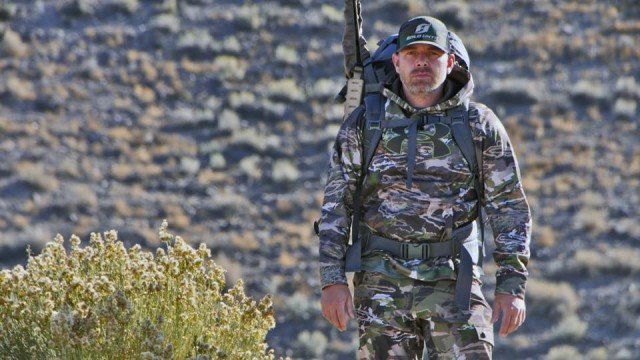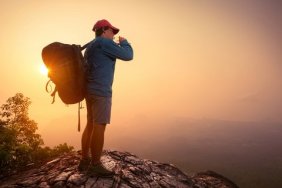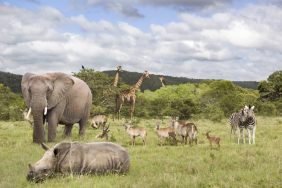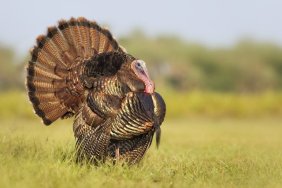Growing up in rural Idaho, Tim Burnett spent more time alone in the woods than most kids his age. In grade school he would come home some days, finish his chores and then inform his mother he’d be sleeping on the mountain that night.
“She would say, ‘Well as long as you’re back for school in the morning go ahead. That’s just how I grew up,” he told LiveOutdoors during a recent interview.
Sleeping alone in the woods was not something most kids his age would do, but they weren’t becoming a future reality television star. Hunting alone is something that just comes naturally to Burnett, who’s managed to make a career out of it as the creator, producer and co-host of SOLO HNTR on the Outdoor Channel.
Now filming its seventh season, we caught up to Burnett over the phone from his home in Reno,Nevada between hunting trips. The show documents solo hunts by Burnett and partner Remi Warren mostly in the northern United States where in separate episodes they each camp out, track big game, pack it out and film it all by themselves.
Most of the episodes take place close to home in Idaho, Montana and Nevada. Burnett makes his home in Reno with his wife and three kids. They’ve also shot episodes in Alaska and New Zealand, or other US states, though he doesn’t have much interest in hunting in Africa.
When we spoke, Burnett had shot a deer near the Montana border earlier that week. It’s during the fall rut when Burnett gets most of his filming done for the next season, so in just the previous month he’d been to five different states, not strictly for SOLO HNTR. He is also hosting and producing another show called Prime Pro to air on the Sportsman and Pursuit channels beginning December 28.
Burnett, who said he dropped out of college to spend more time fishing, has always preferred the solitude of a lake or meadow to the big city. In the world of reality television, his dedication has paid off. More than just a television show, he has created a brand through corporate sponsors and now a line of outdoor gear for hunters.
SOLO HNTR has become one of the most popular hunting shows on television because the episodes are shot well, told well and they give viewers a great perspective on actual hunting.
The show has also exposed just how many people hunt alone. Accidents happen like the case earlier this year of a hunter who broke his leg in the woods alone and spent four days crawling to safety. For Burnett, he said it’s not something he thinks about that much, though he does carry a satellite phone.
“It’s always been such a part of my life that I don’t even think about it being dangerous but it probably is for somebody not as experienced,” he said. “I don’t look at it as that big of a deal.”
Read our Q&A below. For more on SOLO HNTR click here.
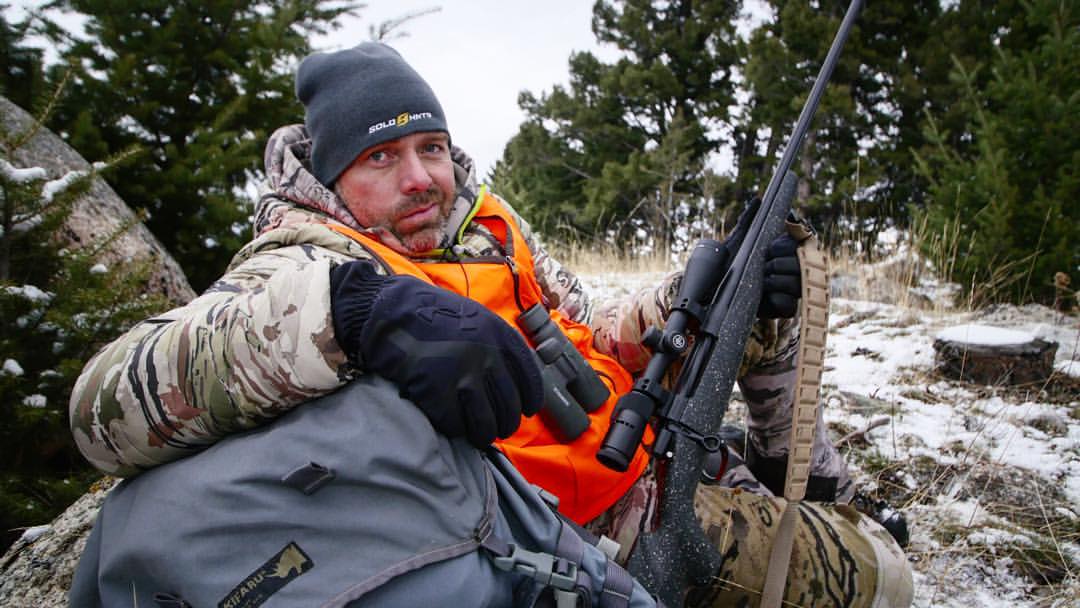
LiveOutdoors: After producing several outdoor shows, what was it that finally got you in front of the camera? Was it a matter of realizing you can do it better?
Burnett: No, really I was content with not being in front of the camera. When SOLO HNTR came about it was always a concept I had in the back of my mind. But when it came to air in 2010 it was totally by chance. I wasn’t quite ready for it. I was producing another show on Sportsman Channel which lost their funding. They quit paying me but I was carrying the contracts with the network. They came to me and said they still needed to fulfill their obligations for the fourth quarter. It was then I thought well if the money is coming out of my pocket, I am going to do my own show. The networks really liked it and we went from there.
LiveOutdoors: What was it about hunting alone at such a young age that attracted you to it?
Burnett: I don’t know if I was depressed as a kid or I just loved that solitude. Most of the time was spent with my brothers and cousins, but as I got older and we each went our separate directions, it was just more natural to be out there alone. Before SOLO HNTR I was mostly a fisherman. It’s kind of the main reason I dropped out of college was to fish. I think it kind of started with that. And I just learned to really enjoy nothing, perfect silence and just listening to the wild. I don’t know what it is.
LiveOutdoors: For people who are thinking about going out there alone, what advice do you have? Should they be extra careful?
Burnett: I have to think about those things. I personally don’t think about them because it’s been a part of my life for so long. We’re always going to be afraid of something we don’t know. But that’s just how I grew up. I don’t look at it as that big of a deal. If people really understand how many men and women hunt alone. I didn’t even understand until that until this show has taken off with so many comments and messages on social media. Man, there are a lot of people out there doing the same thing, and many a lot more hardcore then I do.
LiveOutdoors: Has anything really serious ever happened to you in the woods?
Burnett: Nothing I would say that was life threatening. I have been charged by a couple of bears a few different times. One I yelled really loud and it ran away. Early on before SOLO HNTR I had to dispatch a bear that was charging me. On the first season, the very first episode of SOLO HNTR I shot a white tailed deer out of a tree stand and went to go track the deer and a bear had taken over the carcass and was totally defending it. All it had to do was take a swipe at me but luckily it didn’t. I have been around animals all my life. I feel like I know how they’ll generally react so I don’t have a lot of fear with that, but it’s always in the back of my mind.
LiveOutdoors: Do you have a favorite location to hunt?
Burnett: I always like to go back home to Idaho. There’s just something about the country and growing up in those same mountains. Every year I go back there and hike the same trails and see evidence of when we were there as kids. As far as remoteness and wildness it’s hard to beat parts of Idaho and Montana.
LiveOutdoors: What about a place you haven’t been where you want to go?
Burnett: I want to spend a lot more time in Alaska. There are a lot of places there I want to get to. As far as internationally, I don’t have any desire at all to go to Africa. I’ve been to New Zealand. I kind of want to get to Australia, but man, there is so much country here in the United States like eastern Montana. I’ve driven through there but haven’t spent much time. I feel like the U.S. has so much to offer that I really don’t have much of a desire to do the shocking thing and travel to Russia and all over the world.
LiveOutdoors: What do you think of trophy hunting in Africa?
Burnett: It’s not what it’s perceived to be in Africa. You can go on wild safaris and legitimately hunt animals, but for the most part what you see on television and what most people are going to do is go over there and rack up their trophy tablet. They are going to sit in a blind and kill anything that looks awesome to them. There’s nothing wrong with that. It’s not what I want to do. I like to hunt more than I like to kill. I don’t get my enjoyment by pulling the trigger. I get my enjoyment from everything that leads up to that. The killing part, even for myself, is the hardest part for me to understand. It’s what I’m out there for ultimately, but it’s not the big prize for me.
LiveOutdoors: I can totally understand that. It’s the whole experience.
Burnett: The kill itself is the part you cannot really describe. People in the hunting society are always trying to convince people outside that what we do is ok. We all use the same talking points that we’re doing this for food and it’s a lifestyle. I really can’t come up with the right answer. It’s just like politics or anything else, you are not going to convince the other side. I get urged by people in my industry to be more of an advocate. Why don’t you speak up? This or that. Some people were born and bred to fight the fight, some of us were born and bred to support the cause and the lifestyle. I feel like that’s my role to support the lifestyle of a self-sufficient father. First and foremost the father. The hunting part is really secondary to everything else.
LiveOutdoors: Hunting is so primal and storytelling of the hunt is an ancient pastime. Do you feel like this is a modern version?
Burnett: It really is when you think about all the petroglyphs and drawings on the cave walls. Here in Nevada we have Indian paintings and petroglyphs. The majority of all those are a hunting scenario. Today I guess we’re doing the same thing. We’re just doing it in high definition video.
